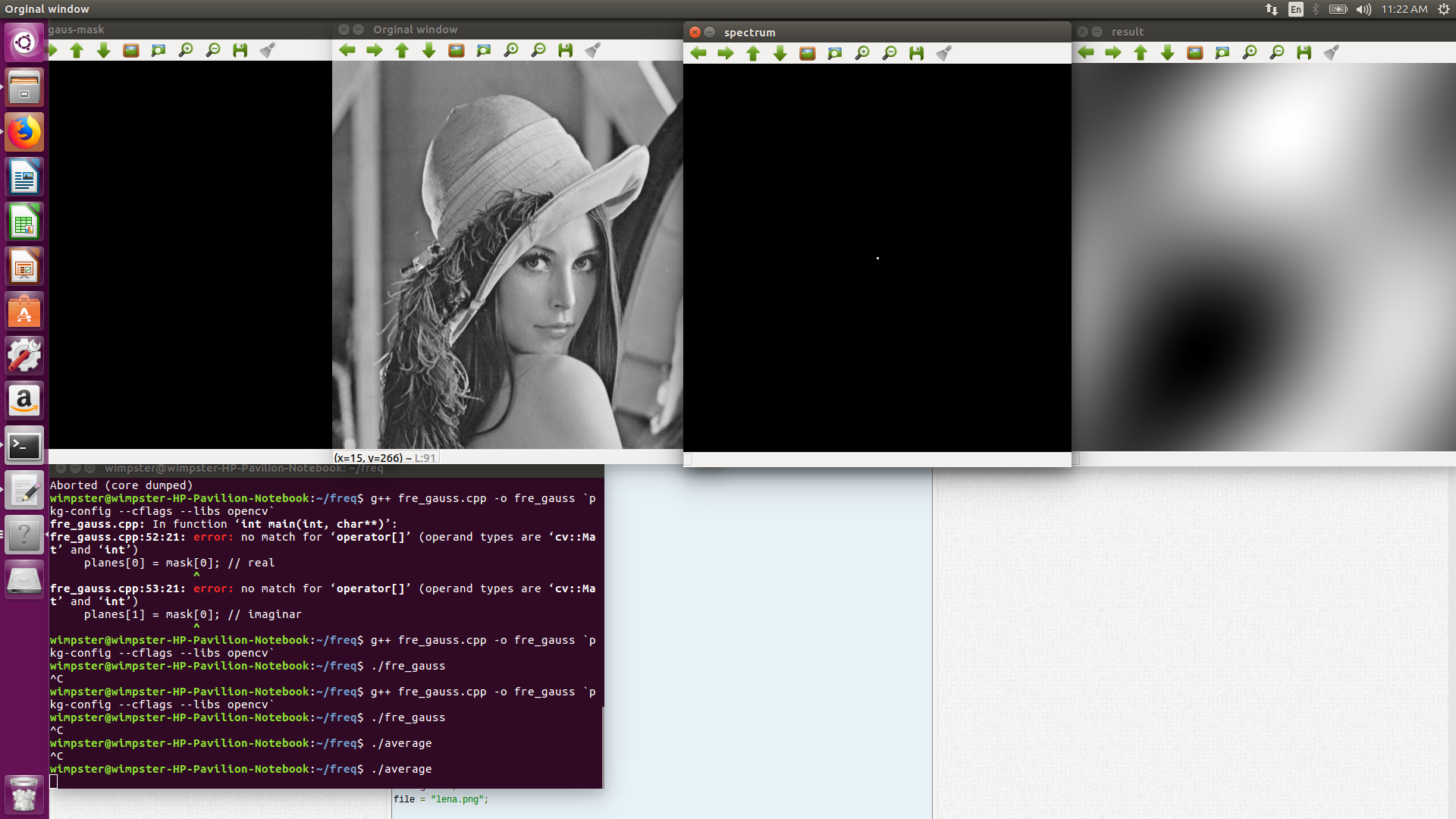#include "opencv2/core/core.hpp"
#include "opencv2/imgproc/imgproc.hpp"
#include "opencv2/highgui/highgui.hpp"
#include <iostream>
#include <stdlib.h>
#include <opencv2/opencv.hpp>
#include <stdio.h>
using namespace cv;
using namespace std;
Mat updateMag(Mat complex);
void updateResult(Mat complex);
Mat computeDFT(Mat image);
Mat createavg(Size imsize);
void shift(Mat magI);
int kernel_size = 0;
int r = 100;
int main( int argc, char** argv )
{
String file;
file = "lena.png";
Mat image = imread(file, CV_LOAD_IMAGE_GRAYSCALE);
namedWindow( "Orginal window", CV_WINDOW_AUTOSIZE );// Create a window for display.
imshow( "Orginal window", image ); // Show our image inside it.
Mat complex = computeDFT(image);
/*Mat temp=updateMag(complex);
namedWindow( "image fourier", CV_WINDOW_AUTOSIZE );
imshow("image fourier", temp);*/
namedWindow( "spectrum", CV_WINDOW_AUTOSIZE );
Mat mask = createavg(complex.size());
shift(mask);
//mask= computeDFT(mask); //Compute DFT of mask
//mask =updateMag(mask); //show the mask spectrum
imshow("gaus-mask", mask);
Mat planes[] = {Mat::zeros(complex.size(), CV_32F), Mat::zeros(complex.size(), CV_32F)};
Mat kernel_spec;
planes[0] = mask; // real
planes[1] = mask; // imaginar
merge(planes, 2, kernel_spec);
mulSpectrums(complex, kernel_spec, complex, DFT_ROWS);
Mat temp = updateMag(complex);
imshow("spectrum", temp);
// compute magnitude of complex, switch to logarithmic scale and display...
updateResult(complex); // do inverse transform and display the result image
waitKey(0);
return 0;
}
void updateResult(Mat complex)
{
Mat work;
idft(complex, work);
// dft(complex, work, DFT_INVERSE + DFT_SCALE);
Mat planes[] = {Mat::zeros(complex.size(), CV_32F), Mat::zeros(complex.size(), CV_32F)};
split(work, planes); // planes[0] = Re(DFT(I)), planes[1] = Im(DFT(I))
magnitude(planes[0], planes[1], work); // === sqrt(Re(DFT(I))^2 + Im(DFT(I))^2)
normalize(work, work, 0, 1, NORM_MINMAX);
imshow("result", work);
}
Mat updateMag(Mat complex )
{
Mat magI;
Mat planes[] = {Mat::zeros(complex.size(), CV_32F), Mat::zeros(complex.size(), CV_32F)};
split(complex, planes); // planes[0] = Re(DFT(I)), planes[1] = Im(DFT(I))
magnitude(planes[0], planes[1], magI); // sqrt(Re(DFT(I))^2 + Im(DFT(I))^2)
// switch to logarithmic scale: log(1 + magnitude)
magI += Scalar::all(1);
log(magI, magI);
shift(magI);
normalize(magI, magI, 1, 0, NORM_INF); // Transform the matrix with float values into a
return magI; // viewable image form (float between values 0 and 1).
//imshow("spectrum", magI);
}
Mat computeDFT(Mat image) {
Mat padded; //expand input image to optimal size
int m = getOptimalDFTSize( image.rows );
int n = getOptimalDFTSize( image.cols ); // on the border add zero values
copyMakeBorder(image, padded, 0, m - image.rows, 0, n - image.cols, BORDER_CONSTANT, Scalar::all(0));
Mat planes[] = {Mat_<float>(padded), Mat::zeros(padded.size(), CV_32F)};
Mat complex;
merge(planes, 2, complex); // Add to the expanded another plane with zeros
dft(complex, complex, DFT_COMPLEX_OUTPUT); // furier transform
return complex;
}
Mat createavg(Size imsize) {
// call openCV gaussian kernel generator
/*double sigma = (r/SIGMA_CLIP+0.5f);
Mat kernelX = getGaussianKernel(2*radius+1, sigma, CV_32F);
Mat kernelY = getGaussianKernel(2*radius+1, sigma, CV_32F);*/
Mat kernel = (Mat_<float>(3, 3) << 0.111, 0.111, 0.111,
0.111, 0.111, 0.111,
0.111, 0.111, 0.111);
// create 2d gaus
//Mat kernel = kernelX * kernelY.t();
int w = imsize.width-kernel.cols;
int h = imsize.height-kernel.rows;
int r = w/2;
int l = imsize.width-kernel.cols -r;
int b = h/2;
int t = imsize.height-kernel.rows -b;
Mat ret;
copyMakeBorder(kernel,ret,t,b,l,r,BORDER_CONSTANT,Scalar::all(0));
return ret;
}
void shift(Mat magI) {
// crop if it has an odd number of rows or columns
magI = magI(Rect(0, 0, magI.cols & -2, magI.rows & -2));
int cx = magI.cols/2;
int cy = magI.rows/2;
Mat q0(magI, Rect(0, 0, cx, cy)); // Top-Left - Create a ROI per quadrant
Mat q1(magI, Rect(cx, 0, cx, cy)); // Top-Right
Mat q2(magI, Rect(0, cy, cx, cy)); // Bottom-Left
Mat q3(magI, Rect(cx, cy, cx, cy)); // Bottom-Right
Mat tmp; // swap quadrants (Top-Left with Bottom-Right)
q0.copyTo(tmp);
q3.copyTo(q0);
tmp.copyTo(q3);
q1.copyTo(tmp); // swap quadrant (Top-Right with Bottom-Left)
q2.copyTo(q1);
tmp.copyTo(q2);
}
I tried to perform average filter convolution in frequency domain, the output image comes out to be very much blurred, i am not able to quite understand why?
As the same kernel in spatial domain gave fine results


